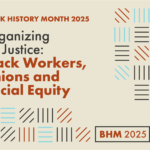This year’s African Heritage Month is especially important for two reasons; the United Nations (UN) has declared 2015 2024 to be the International Decade for People of African Descent, and this African Heritage Month kick starts a decade of political advocacy throughout the world.
Meanwhile in Canada, federal elections will be held this year presenting a real opportunity for the Black community to challenge political parties on their social and economic policy records and election platforms. With this year’s election in our sights, we have identified four key issues that resonate with the Black community: jobs, retirement security, health care and childcare. This month we turn our focus to jobs and income insecurity for the Black community. Workers from the community will be asking the federal government and all federal parties how their national job and training strategy will provide opportunities for Black workers to get good jobs and contribute to the economic and social development of Canada.
It is not acceptable that in 2011, 13.2% of racialized workers toiled in minimum wage jobs, compared to a rate of 9% for all workers. Among recent immigrants, many of whom are racialized newcomers, 19.1% are working at the minimum wage. This is a rate more than double for the total workforce. More than 30% of self employed immigrants indicate that their self-employment is due to a shortage of paid work. Among Canadian-born, self-employed workers, that figure is much lower at 20%.
The federal Temporary Foreign Worker Program (TFWP) brings thousands of migrant workers to Canada from Caribbean countries to work as seasonal farm workers or live-in caregivers. The recent changes by the federal government will negatively affect these workers from communities of African descent, by limiting access to permanent residency and health benefits.
The work of Canadian unions at the bargaining table and policy level are part of our commitment to improving the lives of workers, and the broad effort in building this country. Statistics Canada predicts that by 2020, due to demographic changes, we will be dependent upon newcomers as the core source for population growth. A study done for the federal government indicates that immigrants and their children will likely make up half of the working age population by 2031. A big percentage of newcomers will be people of African descent.
As part of our policy advocacy work, unions have supported employment equity legislation at the provincial and federal level despite the opposition from conservative forces.
Canada is a country built by Aboriginal peoples and immigrants from around the world. The labour movement wants to ensure that people of African descent have every opportunity to contribute to the social and economic welfare of Canada, without any barriers.





